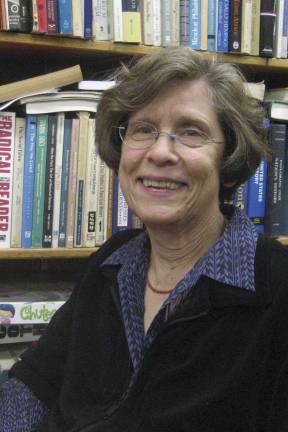Ann Cook Is a Champion for Education Reform in the City

Ann Cook has been the co-director of Urban Academy since the school started in 1985, but she speaks proudly of her work this year as executive director of the New York Performance Standards Consortium. She says she is deeply involved with the organization.
The consortium represents a group of high schools that have implemented a system of performance based assessment to graduate students, rather than relying strictly on standardized testing, by an agreement with the board of regents. Cook says the system is used in 28 schools across the state and 26 schools in the city.
High school students who are part of the consortium take one regents exam and otherwise complete performance based assessments. The consortium's mission statement is that when it comes to education, "one size does not fit all."
Cook describes the strides that have been made this year by the organization, including an evolving system of assessment that involves a great deal of professional development for teachers in schools.
"We just had a conference-a citywide staff development day, and we had our annual conference of about 600 teachers," says Cook.
The conference incorporates workshops for teachers and speakers, including Cook herself, who presented at the conference.
"We've also been documenting the work that goes on in the consortium schools and put out a report with data that shows just how effective this way of assessing is," she adds.
Still, Cook and the consortium have had some struggles this year.
"I think there are always challenges facing public schools and public education," she says. "There's still an overemphasis on testing."
"We're finding another way besides standardized testing," adds Cook. "The tides may be turning, but even though we've designed a system that's very effective there's still a lot of emphasis on high stakes testing."
The "other way" Cook describes involves performance based achievement that reflects specifically how well students would be able to function in college, for instance defending research papers, writing literary essays and performing science experiments. The consortium pushes classes that are more in-depth than mere test preparation.
"The DOE uses those test scores to measure everything from teacher effectiveness to school success and that's a big challenge," explains Cook. "It's this sort of use and misuse of standardized test scores"
"There's so much more to educational success than a score," she adds. "Children aren't test scores, they're more complex."
The consortium has been empirically successful. Cook says the kids in consortium schools are doing better in college than their peers, the schools have higher rates of teacher retention, lower incident rates and greater overall college retention.
She adds the alternative system has doubled the rate of graduating English language learners compared to the rest of the city.
"People have to ask what is it we want kids to be able to do when they leave high school," she says. "We're preparing kids to survive and get the most out of the college experience."